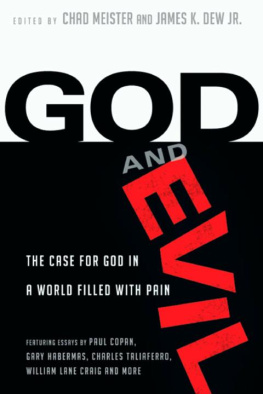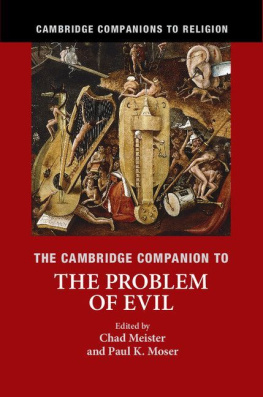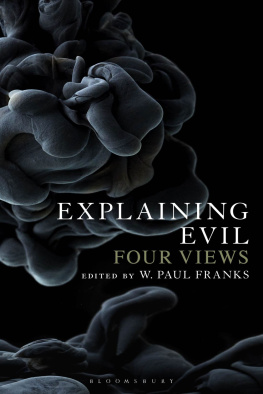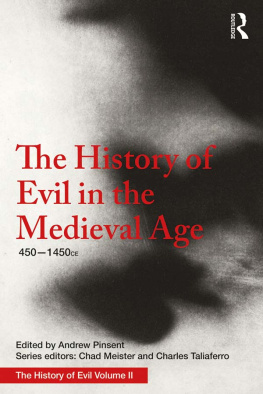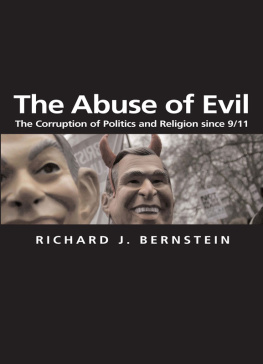THE CASE FOR GOD IN
A WORLD FILLED WITH PRIN
An imprint of InterVarsity Press Downers Grove, Illinois





............. 7
.............. 9
Part One: What Is Evil and Why Is It a Problem?
......... 15
Gregory E. Ganssle and Yena Lee
......... 26
James K. Dew Jr.
.......... 38
Bruce Little
Part Two: Some Reasons God Might Allow Evil
...... 53
Garry DeWeese
....... 65
R. Douglas Geivett
James Spiegel
..... 94
Jill Graper Hernandez
Part Three: Evil and Other Relevant Themes
Paul Copan
........... 124
Paul Copan
........ 138
Chad Meister
........ 152
Charles Taliaferro
.... 163
Gary Habermas
........ 175
Win Corduan
......... 197
David Beck
........ 214
Gregory E. Ganssle
Part Four: Issues in Dialogue
... 227
William Lane Craig
.......... 243
Kyle Blanchette and Jerry L. Walls
....... 259
William Dembski
......... 270
Karl W. Giberson and Francis S. Collins
........... 291
William Lane Craig and Michael Tooley
.............. 327
................ 329
.............. 355
.............. 357

e wish to express our appreciation to a number of individuals who have been instrumental in the development of this volume. First, the contributors have done a superb job of expressing their positions and arguments in clear and accessible language-something not always easy to achieve. These colleagues are leading experts in their respective areas of emphasis, and their contributions are outstanding. A special thanks goes to Carrie Picklesimer for her labors in transcribing the Craig-Tooley debate-no easy task, to say the least! We also thank William Lane Craig and Michael Tooley for their own editorial work on the transcription of their debate. The printed form of the debate included in this book (the only published version in print) is an accurate representation of the live engagement they had in debate. Finally, we are grateful to David Zimmerman and the entire editorial and support staff at InterVarsity Press for their strong support and encouragement of this project. They have been most helpful and a real joy to work with.
Chad Meister
James K. Dew Jr.

here are few topics in the history of Christianity-indeed, of Western thought in general-about which more has been discussed, debated and published than this one. Perhaps the main reason for so much reflection is that most people (in the West at least) have believed that there is a God who created and sustains the world and that the reality of evil in this world is a real problem. Put concisely, people generally believe that God exists and that evil is ubiquitous. The problem is that these two claims seem to conflict. Can we reasonably maintain that both of them are true? If so, how do we make sense of them? If God really exists, why is there evil? Where did it come from? And why doesn't God eliminate it? Does he not want the removal of evil? Is he unable to do it? Is God disinterested in the troubles of our world? The central goal of this book is to provide reasonable answers to these kinds of questions and to present various ways evangelical Christians have wrestled with the issues.
The book is divided into four parts. Part one begins by looking at the nature of evil and the problems it creates for those who believe in God. Even though, historically, reference has typically been made to "the problem of evil," there are, in fact, a host of problems that theists face given the reality and extent of evil. This section hones in on three broad kinds of problems: evidential, logical and gratuitous evil.
Part two explores some of the reasons God might allow evil to come to be and continue to exist in our world. These chapters explore both defenses and theodicies. A defense is an attempt to show that there is no logical incompatibility between the existence of evil and the existence of God. Defenses take a defensive posture and attempt to deflect the charge of inconsistency or incoherence of the claims that both God and evil exist. A theodicy, on the other hand attempts to demonstrate that for every evil that exists, there is a morally sufficient reason for God's allowing it to exist. So evil is completely justified in a world God created. Throughout history Christian theologians and philosophers have tackled these issues, offering defenses or theodicies of one sort or another, and their rich insights have much to teach us today. Throughout these essays the authors sometimes utilize, build on or engage with these and other brilliant minds within Christian theology and philosophy.
Part three covers eight significant themes relevant to God and evil. Topics here range from the origin of sin and evil to divine hiddenness and prayer to evil among the various religions. The last two chapters examine specifically whether evil counts as evidence against God and Christianity (as the new atheists maintain) or whether it provides evidence for God and Christianity (perhaps a surprising claim to many).
In part four-a kind of point-counterpoint section-there are four essays on topics about which there are serious disagreements among evangelical Christians. One of the beautiful dimensions of the Christian faith is that it is broad enough to include disagreement. In this book, some of the contributors disagree with other contributors. Some people see such disagreement as a liability of faith. We see it as a marvelous asset. In fact, even we the editors don't agree on everything in this book! For example, one of us James-does not affirm inclusivism as a plausible evangelical position, while the other-Chaddoes. Yet, given the gravity of these issues, we think it is important for us to dialogue about such things even when we disagree. We recognize that as humans we are not only less than omniscient, we are really quite fallible. As evangelical Christians we take our faith (trust, beliefs), the history of our faith (the church), the author and guide of our faith (God) and the central instrument of our faith (the Bible) quite seriously. While we believe the biblical text is inspired, we don't maintain that our interpretations of it are. So there will likely be disagreement, but it should be respectful and kind. And it is in and through such affirmative disagreement that we can learn from one another, as iron sharpens iron.

